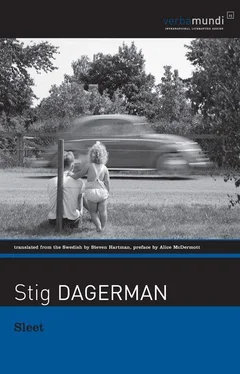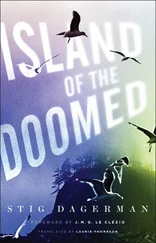Now we meet the new schoolmaster on the road, and he’s so stuck-up he can barely bring himself to lift his hat. Ulrik tells me old Jacob is dead. He was the schoolmaster in my day.
“Gave up the ghost right there in his yard, sitting in a chair,” he says. “The old ones is going. No question about that. First it was Mamma, then Jonsson, who ran the mill …”
He drowned in the mill creek last fall, I heard. Everybody heard it. It was on the radio: “In Kvarnlunda eighty-two-year-old Elov Jonsson, former mill proprietor, was pronounced dead on Tuesday evening, the apparent victim of a drowning.” That very same week an old woman got run over on the highway, though I can’t say I knew her.
“Then come old Jacob,” Ulrik says, “and Stenlund, who got himself cancer and died in the poorhouse. And now it’s the old man.”
A fella on a bicycle comes up behind us, ringing his bell, and so Ulrik steers us over to the edge of the road and slows down a good bit. He slides his hat back off his forehead and looks around, first straining round to look behind and then glancing to each side. Like we got to be all alone to talk about the old man. Suddenly he’s turning into a regular chatterbox, and that don’t happen much with him, so you note it when it does. When the bull over at Wiklunds busted out of his pen and run a horn into our little brother’s ribs you should have heard him going on and on all night long about damages and what the law had to say about this and that. The rest of us was all pretty much struck dumb, it was such a revelation that he could string together so many words at the same time. Same thing when we was readying Mamma for burial. Once he got going, it seemed to us he wasn’t ever gonna stop.
“He was supposed to go to the nurse that day,” Ulrik says. “You know how the old man didn’t hear too good a lot of the time. So once he was up and around, he says to me: ‘Ulrik, I’m gonna take that bike and head on down to the nurse in the village ’fore I lose the little bit a hearing I got left. I ain’t heard a single world you said the whole week long!’ And sure enough, he pulls that bike out and sets right off with it. Me, I’m heading into the smithy anyway that morning to pick up the plow. And while I’m standing there bridling Blenda the old man goes tramping off dragging that old bike alongside him. And so I call out to him through the stable door, I say, ‘Hold on there, Dad! I’m heading off to the blacksmith’s, and the nurse ain’t much farther.’ He hadn’t climbed on that thing in a year, you see. And it was all he could do to get his leg up over that bar on account of his rheumatism. ‘Hell with that!’ the old man says to me. ‘Don’t tell me I’m so far gone I can’t ride that little ways over to the nurse’s all by myself.’ So I let him do it, but I didn’t like it. Later when I get to the smithy, the blacksmith is standing out there in his yard and as I’m pulling in through the gate he yells over to me: ‘What you thinking, letting your old man ride all that way by himself?’ So I say, ‘All that way? Since when is the nurse’s place a long way off?’ ‘The nurse?’ he fires right back at me. ‘Why, I was over in the market town a while ago. And when I was riding back here with the brewer, we come upon your old man pedaling down the road to Mon! And let me tell you! The way he was wobbling on that bike it won’t take much for there to be a mishap of some kind.’ So that’s when it hit me, what he was really up to. The tin knocker, he lives out there at Mon, and we all know he ain’t the kind to shy away from free-flowing booze, nor to lose sleep wondering where it come from. And I’m pretty sure there was a bulge under dad’s coat when he left home — the more I thought back on it, the more I remembered it that way.
“So I take the plow home. When I get there I go straight away into the old man’s room to have a look in his dresser. But it’s locked and I can’t find the key. The old man, he started getting mistrustful in his old age. And I ain’t the kind to go sniffing around in other people’s dressers anyways, so I just stay out in the shed the rest of the day, mending stuff, pitchforks and potato picks — potato harvest being just a week away. I keep the shed doors wide open while I’m in there, leaning out every now and then to run my eyes up and down the road. But midday comes, and then three o’clock coffee comes, and there ain’t no sign of the old man. That boy, our hand, he putters round the woodpile most of the day, trying to keep the smirk off his face, so he knows the shape of things alright.
“Finally I take my bike,” Ulrik says, “and ride up toward the village. No sign of him anywheres. I stop in at the nurse’s place, just to be on the safe side. And when she opens the door she grabs my hand so sudden and hard, I can’t help getting goose bumps. ‘Yes, your father is here,’ she says to me. And my first thought is I’m glad he didn’t make the whole thing up anyway. But then when I step inside, I see the old man is laying there on a bed, his head wrapped in bandages, snoring up a storm. Not a sightly picture. Nurse tells me how she was standing there looking out the window when she saw the old man come along on the bike, wobbling from one side of the road to next. ‘He’s swerving so bad, I can’t help thinking this probably won’t end well. And just then Doughboy Holmgren comes along in his car, and your dad comes crashing down, bike and all, right in front of him! And Doughboy has just enough time to stop before he runs him over. He was awful lucky there! Doughboy, he helped me carry your father in here. It was a miracle he ever got on that bike to begin with, drunk as he was.’”
So says Ulrik. I don’t know why he thinks he’s got to mention all that stuff about the old man being dead drunk and all, not when the whole thing’s still so close. I’m sure all this just stokes the hot white fire of righteousness for Lydia and her fella. I’ll never forget how they acted at Mamma’s funeral, pissing and moaning just ’cause I was decent enough to bring along my whole legal ration of liquor for the occasion. It seems Ulrik ain’t done yet, ’cause now he brings Blenda to a creeping pace. We must be a sight to behold, hobbling along down the side of the road like we’re on our last leg.
“So I say to the nurse, how’s the old man doing?” Ulrik says. “And she just shakes her head and says he’s gonna need rest. A few days probably. If I can just fix getting him home, she promises to come by in the morning and check up on him. The air was getting awful thick with the smell of brännvin in there, and that’s not so nice right in the middle of potato season and all. Me, I go to get on my bike again to ride home and right there’s the old man’s bike lying in the dirt at the foot of the nurse’s stoop, the handlebars bent up a good bit but otherwise looking okay for the most part. Back home I wait till it’s a little darker before I set out. Don’t much feel like being ogled in the village by everybody and his brother on account of the old man. But then finally I hitch Blenda to the buckboard and head back to the nurse’s. Dad’s still out cold when me and the nurse carry him out. When I get him home, we carry him in to the cot in his room, me and that smirking hand of ours. I don’t much feel like taking the old man’s clothes off, so I put a blanket on him and then head out to milk the cows and tend to the horses.
“When folks come round that evening for their milk you can just tell from all the sly smiles that they know all about it. ‘The old man never was one to turn his back on a drink.’ I hear this more than once. ‘But at his age!’ someone else says to me. For the sons there’s no escaping the sins of the father. Later that night something didn’t sound right in his room, so I went in and struck a match over him. And all of a sudden I was scared. I turned the electric light on, but the old man was already dead. I send our hand to go and to fetch the nurse. But she only stays in there with him for a few minutes, and then she comes out to the kitchen and says to us that she never would have thought it possible, him going so quick like that.”
Читать дальше












